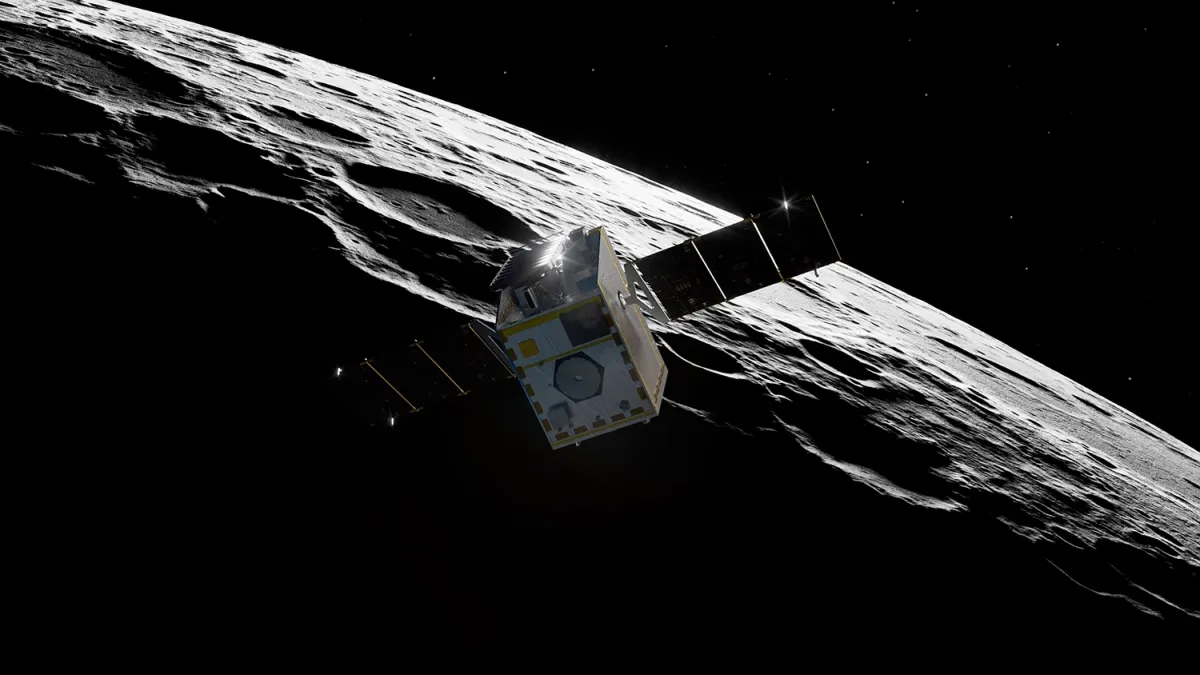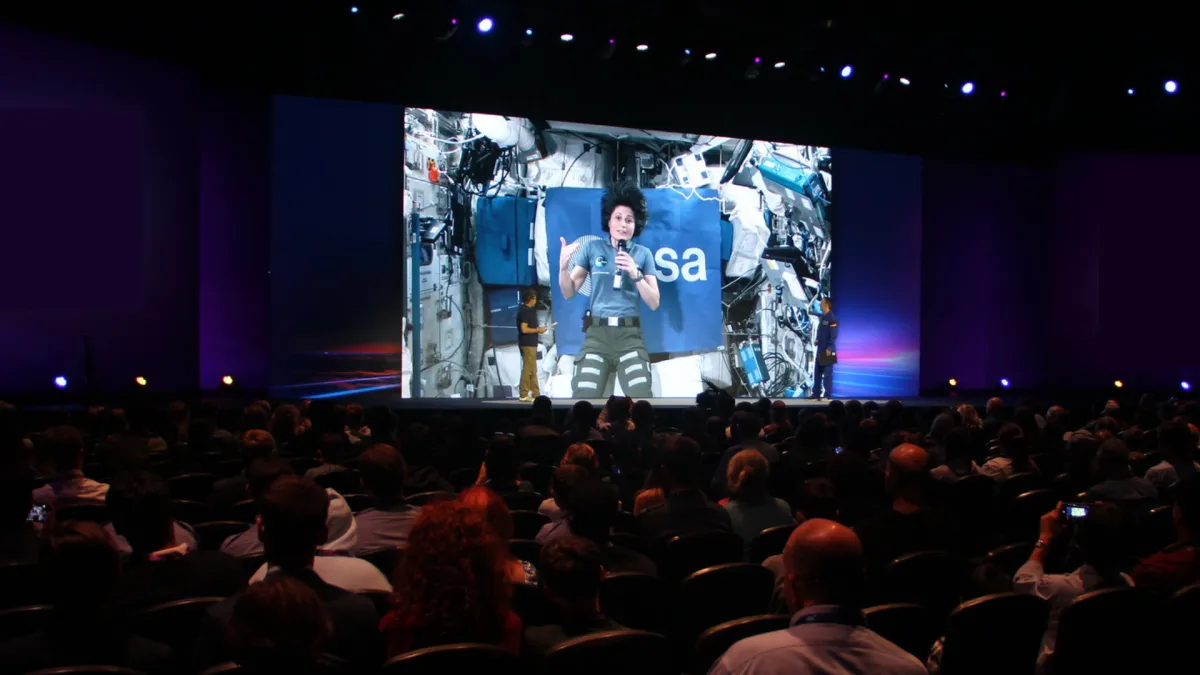02/28/2025 | Welcome to our roundup of top SpaceNews stories, delivered every Friday! This week, NASA's Lunar Trailblazer is in trouble, BAE wins a space weather contract, China plans a new sun-studying mission, and more. | Our Top Story | | |
|
|
|
| |  | By Jeff Foust, Feb. 28, 2025
| Two spacecraft, one from a startup and the other built by a major aerospace company, are experiencing problems after their launch as rideshares on a lunar lander mission.
NASA's Lunar Trailblazer spacecraft was one of three rideshare payloads on the Falcon 9 launch of the IM-2 lunar lander for Intuitive Machines Feb. 26. Those payloads deployed from the Falcon 9 upper stage several minutes after IM-2 was released.
NASA said in a statement about four hours after launch that Lunar Trailblazer had powered up and started transmitting as planned. However, in a subsequent statement late Feb. 27, NASA said that communications with the spacecraft had been lost at about 7:30 a.m. Eastern that day, or roughly 12 hours after launch. Read More |  | Other News From the Week | CIVIL | China to train Pakistani astronaut for Tiangong space station mission
The China Manned Space Engineering Office (CMSEO) and the Pakistan Space and Upper Atmosphere Research Commission (SUPARCO) signed the "Agreement on the Selection and Training of Pakistani Astronauts and Their Participation in China's Space Station Missions" in Islamabad, Pakistan, Feb. 28, CMSEO announced. Read More
BAE wins $230.6 million contract for space weather program
BAE Systems won a $230.6 million NASA contract to deliver spacecraft for the National Oceanic and Atmospheric Agency's Lagrange 1 Series space weather project. Under the firm-fixed-price award, announced Feb. 21, BAE Systems Space & Mission Systems, formerly Ball Aerospace, will develop Lagrange 1 Series spacecraft, integrate instruments, and support flight and mission operations. Contract-related work, scheduled to begin this month, will be performed in Boulder, Colorado, through January 2034. Read More
China to send a spacecraft out of the ecliptic to study the Sun's poles
The Solar Polar Orbit Observatory is currently scheduled to launch in 2029. The spacecraft will perform a gravity assist maneuver at Jupiter, altering its course to enter a high-inclination orbit around the Sun, enabling observations of the solar poles. Read More | | | Loving SpaceNews This Week? Check out SpaceNext: AI, where we look at how artificial intelligence is becoming integral to the space industry, and how companies and agencies are using it for their missions. | | | POLICY & POLITICS | House hearing debates ways to improve Artemis Two former government officials offered conflicting advice to a House committee on how to change NASA's Artemis lunar exploration campaign, but agreed that a return to the moon was a prerequisite for human missions to Mars. Read More
South Korea approves strategic plans for space
The Korea AeroSpace Administration's (KASA) strategic plans for the sectors of space transportation, satellites, and space science exploration were approved by the third National Space Council held Feb. 25. "Flagship projects" for these strategies include reusable launch vehicles and orbital transfer vehicles, ultra-high-resolution satellites and very-low Earth orbit (VLEO) satellites with multi-layered orbital navigation systems, and a space observatory to be sent to the Sun-Earth L4 Lagrange point—a region of space yet to be visited—and lunar landers. Read More | | | COMMERCIAL | SES shareholder pushes to curb state control to tackle market challenges
A shareholder with more than 7% of SES' economic interests is calling for reduced state control over the Luxembourg-based satellite operator, arguing that greater independence is needed to tackle mounting challenges. Read More
Eutelsat hails pioneering 5G test over LEO Amid growing efforts to bridge satellites and mobile networks, Eutelsat said it has successfully employed its OneWeb low Earth orbit (LEO) constellation to connect a broadband terminal with a core 5G network using next-generation smartphone protocols. Read More | | | MILITARY | War of words heats up over Space Force's strategic posture
A recent critique of the U.S. Space Force's guiding principles for competing against adversaries has provoked strong pushback from the Space Force's leadership and its advocates, exposing disagreements about how the U.S. should prepare for potential conflicts beyond Earth's atmosphere. Read More
U.S. Air Force to explore Xona Space's commercial alternative to GPS
California-based startup Xona Space Systems has been awarded a $4.6 million contract from the Air Force Research Laboratory (AFRL) to demonstrate how its satellite-based positioning, navigation, and timing (PNT) service could support military operations, the company announced Feb. 25. Read More |
|  | | | OPINION | |
|  | By Rick Liebling, Feb. 28
| The space industry thrives on precision, innovation and scientific rigor. But in today's media landscape, facts often take a backseat to spectacle. Two of the loudest voices in the space sector — Elon Musk and Donald Trump — garner an inordinate amount of media coverage and wield massive platforms of their own to shape narratives, often making exaggerated or outright false claims. This allows them to not only push their own agendas, but to turn public sentiment against their rivals whether they be political or commercial. One need only look at their recent comments regarding the ISS and accusation of "abandoned astronauts" for an example of how this can play out. For independent space companies, this presents a serious challenge: how do you counter misinformation when your adversaries dominate the media cycle and don't play fair?
Traditionally, space companies have responded with careful press releases and technical briefings. But that's no longer enough. If the independent space sector wants to push back effectively, it must adopt more aggressive and unconventional strategies. Read More
Space endurance: A call for more dialogue, not less
By Col. Pete Atkinson
The future of advanced air mobility under a new Congress and Trump administration
By Rod Hall, Jake Kohn and Liz Demaree
Keep NASA's innovation engine going
By Andrew Rush
Time to refocus: America needs a stronger Space Force
By John E. Hyten and Nina Armagno
Reaping space's decline? Why to choose the durability of due regard over the debris of military devastation
By Michael Garetto-Balmer
| SpaceNews is committed to publishing our community's diverse perspectives. Whether you're an academic, executive, engineer or even just a concerned citizen of the cosmos, send your arguments and viewpoints to opinion@spacenews.com to be considered for publication online or in our next magazine. | | |  | Publish your press release with SpaceNews' premier press release service and start seeing results today.
| Latest Press Releases |
|
|
|
Sponsored Post |  | | By Farnborough International Space Show
Speakers from Rolls-Royce, Thales Alenia, NOAA, Babcock, European Space Agency, UK Space Agency, and Egyptian Space Agency are the latest to join the growing programmes of the Farnborough International Space Show and The 40th International Symposium on Remote Sensing of Environment (ISRSE-40). Read More
| | |
|
| What's New With SpaceNews? |  | Check out the latest episode of our new podcast, Space Minds. Join David Ariosto, Mike Gruss and journalists from the SpaceNews team for compelling interviews with scientists, founders and experts who love to talk about space, and their takes on the week's biggest news.
New episodes come out every Thursday on SpaceNews.com, YouTube and wherever you listen to your favorite podcasts.
|
|
| | | | |
|
|